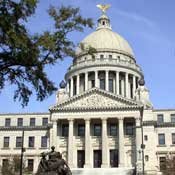The Mississippi House and Senate are desperately hammering out an agreement on a state appropriation bill one day after Gov. Haley Barbour finally called a special session. Barbour had initially fought the idea of a special session, after disagreeing with a House and Senate conference settlement filling a Medicaid budget hole with a $60 million tax on hospitals that accept Medicaid patients.
Barbour initially wanted the entire $90 million budget hole filled with a hospital tax, arguing that hospitals had been responsible for filling the hole in the past. Hospital advocates countered that the $90 million tax Barbour is seeking to re-apply to hospitals is not the same tax hospitals paid prior to 2005. They warn that many hospitals will have to cut staff, or pass costs down to non-Medicaid patients if they are responsible for the full $90 million.
Barbour ordered lawmakers back to the Capitol on Sunday, however, after legislators and state Attorney General Jim Hood warned that many state agencies, including state troopers and park rangers, would be unpaid and likely absent from roads and waterways during the July 4 weekendan infamous holiday for alcohol abuse.
Hood also warned that the state will have to duck out of road and bridge construction contractsand teacher contractsif the budget is not financed. He added that his office will likely be battling lawsuits for "years to come" if the budget forces the state to cut and run on contracts.
Legislators must come to an agreement on the budget and send it to Barbour to sign before June 30, or risk killing contracts or shutting down portions of state government not named specifically in the state's constitution, such as the gaming commission and highway patrol.
On Sunday, lawmakers concentrated on setting up a special fund to offset statewide increases in car tags. Barbour, a former tobacco lobbyist for tobacco companies that settled with the state for medical costs in 1999, proposed raising taxes on tobacco companies not involved with the $246 billion multi-state settlement.
Members of the House, such as Rep. Bob Evans, D-Monticello, were still considering Barbour's proposal Monday morning, pushing for an amendment to a House appropriation bill that would have raised taxes on tobacco companies not formerly represented by Barbour. Evans said the amendment was key to keeping car tag costs at a minimum.
"There are arguments that some (tobacco companies) may go out of business. If they go out of business, I'm sorry, but I'm here to do the people's work, not to look after products that may be deadly if people use them," Evans said. "I was told yesterday that the governor has no problem with my amendment, and that we have the votes to pass it today. It is clear that we have not taken care of the car tags. You haven't taken care of car tags if they'll still cost more."
House Ways and Means Committee Chairman Percy Watson, D-Hattiesburg, warned that many Republicans in the Senate were aligning against Barbour on the tobacco tax increase on independent tobacco companies, and that the House amendment could get voted down and further stall the process.
Sen. Lee Yancey, R-Brandon, told the Senate yesterday that the state shouldn't put more taxes on companies that were not sued or did not exist at the time of the 1999 settlement.
"When is the government going to stop trying to meddle in people's lives by continuing to try to raise taxes?" Yancey asked, according to The Clarion-Ledger.
Rep. John Mayo, D-Clarksdale, noted in his blog that the Senate "killed a House tobacco tax bill that would add 1 cent (amended and passed at 2.17 cents) on independent tobacco companies."
Watson, meanwhile, warned that senators with Yancey's view would stall a bill containing this House amendment.
"(The Senate will argue that) to put this additional tax on these small manufacturers at this time, in addition to the federal and state tax is too much for one year. We'll send it to the senate, they'll kill it, and we'll be here Friday, Saturday, and Sunday, trying to get out of this special session," Watson told the House. "Let's put this issue behind us so we can begin the appropriation process."
Barbour expanded the session agenda today to encompass general-fund agencies, with a high priority on K-12 education. Barbour has made no mention of the Medicaid issue, however, considering it unresolved, even though Lt. Gov. Phil Bryant and members of the House declared they had reached an agreement on the Medicaid shortfall last Sunday.
The bill conferees agreed to include a smaller hospital tax that charged hospitals on a sliding scale based upon federal payout, initially taxing hospitals to the tune of $60 million, which could go up to the full $90 million after federal stimulus help expires at the end of 2010. In exchange, however, hospitals would be immune to future cuts.
Barbour opposed the agreement, saying cuts may be necessary to keep Medicaid from opening another budget hole, and told Bryant to nix the deal.
As of this morning, Medicaid still was not on the agenda, suggesting that an agreement had yet to be reached between House negotiators and Barbour, whoas some embittered House members point outis not a legislator.



Comments
Use the comment form below to begin a discussion about this content.